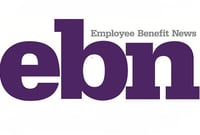
Spencer Williams
As President and CEO, J. Spencer Williams applies more than 25 years of experience in starting, building and leading businesses in the financial services industry. Under his leadership, Retirement Clearinghouse has introduced new industry best practices, been recognized for innovation, improved the operations of thousands of retirement plans, and enhanced the retirement prospects of hundreds of thousands of retirement plan participants.
-
Blog
- 401k Cash Outs
- 401k Consolidation
- 401k Plan Termination
- America's Mobile Workforce
- Assisted Roll-in
- Auto Enrollment
- Auto Portability
- Auto Portability Simulation
- Automatic Roll-In
- Automatic Rollover
- Automatic Rollovers
- Boston Research Technologies
- CARES act
- Common Mistakes
- DIY Roll-In
- DOL Advisory Opinion
- EBRI
- Employee Benefit News
- ERISA Advisory Council
- Financial Services Roundtable
- Financial Wellness
- How-To
- In-Plan Consolidation
- Leakage
- Lifetime Plan Participation
- Lost Participants
- Managed Portability
- Mandatory Distributions
- MarketWatch
- Missing Participant IRA
- Missing Participants
- National Retirement Savings Cash Out Clock
- Participant Transition Management
- PLANSPONSOR
- Portability Services Network
- PSCA
- Public Policy
- RCH Services
- Retirement Income
- Retirement Plan Portability
- retirement research
- Retirement Savings Consolidation
- Retirement Savings Portability
- Roll-In
- Safe Harbor IRA
- Saver's Match
- Security
- Small Accounts
- Stale Dated Checks
- Synthetic Tenure
- Uncashed Check Services
- Uncashed Distribution Checks
- Video
- Webcast
- What is a Missing Participant?
Consolidation Corner Blog
Consolidation Corner is the Retirement Clearinghouse (RCH) blog, and features the latest articles and bylines from our executives, addressing important retirement savings portability topics.
Think Twice Before Tapping Your 401(k) for Short-Term Needs
 In extraordinary times like these, it is understandable that Americans need emergency cash injections to pay expenses. But before tapping their 401(k)s, workers should at least follow the advice offered by the old saying “think twice,” and consider all sources of short-term cash, before prematurely cashing out their 401(k) savings (WSJ: “The Emergency 401(k) Button,” March 20). Even if tax and other penalties on 401(k) cash-outs during this period are waived, Americans who cash out forfeit the additional savings which the sums they receive would have accrued by retirement, had they remained incubated in the U.S. retirement system.
In extraordinary times like these, it is understandable that Americans need emergency cash injections to pay expenses. But before tapping their 401(k)s, workers should at least follow the advice offered by the old saying “think twice,” and consider all sources of short-term cash, before prematurely cashing out their 401(k) savings (WSJ: “The Emergency 401(k) Button,” March 20). Even if tax and other penalties on 401(k) cash-outs during this period are waived, Americans who cash out forfeit the additional savings which the sums they receive would have accrued by retirement, had they remained incubated in the U.S. retirement system.
The Institutionalization of Portability is Key to Reducing Cash-Out Leakage
 Although defined contribution plan recordkeepers and sponsors have made considerable progress helping participants retain savings through reduced fees over the past decade, job-changing participants’ 401(k) savings account balances remain in a state of dangerous limbo, as participants often succumb to the temptation of cashing out. EBRI reports that at least 4.5 million—or 40%—of job-changing participants cash out $92.4 billion in 401(k) savings from the U.S. retirement system every year.
Although defined contribution plan recordkeepers and sponsors have made considerable progress helping participants retain savings through reduced fees over the past decade, job-changing participants’ 401(k) savings account balances remain in a state of dangerous limbo, as participants often succumb to the temptation of cashing out. EBRI reports that at least 4.5 million—or 40%—of job-changing participants cash out $92.4 billion in 401(k) savings from the U.S. retirement system every year.
How Sponsors can Help Minorities Save More for Retirement
 Every year, our nation’s retirement system loses $92 billion in savings because 401(k) plan participants prematurely cash out their accounts when they change jobs. This is the most recent estimate from the Employee Benefit Research Institute (EBRI), and while this finding affects all American workers, minorities are hit hardest.
Every year, our nation’s retirement system loses $92 billion in savings because 401(k) plan participants prematurely cash out their accounts when they change jobs. This is the most recent estimate from the Employee Benefit Research Institute (EBRI), and while this finding affects all American workers, minorities are hit hardest.
A Financial Wellness Program You Can Actually Measure
Although the financial wellness of employees has emerged as a top priority for employers in recent years, too many workers are still struggling to improve their financial health.
The Surprising Migratory Patterns of Job-Changing Participants
 Much has been written in the media, including this column, about the increase in mobility of today’s American workforce.
Much has been written in the media, including this column, about the increase in mobility of today’s American workforce.
Safe-Harbor IRAs are Supposed to be Temporary
Cash-Out Leakage is Still Too High—and Auto Portability can Help
 401(k) account cash-outs remain a potent threat to Americans’ retirement-readiness and by all accounts the U.S. Department of Labor agrees, having issued its final Prohibited Transaction Exemption (PTE) for auto portability at the end of July.
401(k) account cash-outs remain a potent threat to Americans’ retirement-readiness and by all accounts the U.S. Department of Labor agrees, having issued its final Prohibited Transaction Exemption (PTE) for auto portability at the end of July.
The Safe-Harbor IRA: Friend or Foe?
An Important Milestone: The DOL Issues Final Prohibited Transaction Exemption for Auto Portability
 On July 31st, the U.S. Department of Labor (DOL) released the final Prohibited Transaction Exemption (PTE) to Retirement Clearinghouse (RCH) for the RCH Auto Portability program, completing the regulatory framework and clearing the way for auto portability’s widespread adoption.
On July 31st, the U.S. Department of Labor (DOL) released the final Prohibited Transaction Exemption (PTE) to Retirement Clearinghouse (RCH) for the RCH Auto Portability program, completing the regulatory framework and clearing the way for auto portability’s widespread adoption.
This new development represents an important milestone on the path to auto portability, a private-sector innovation that will help prevent 401(k) cashout leakage, increase plan efficiencies and improve the prospects of a timely, comfortable and secure retirement for millions of Americans.
What’s Missing from the SECURE Act? A Provision to Plug Cash-Out Leakage

The Setting Every Community Up for Retirement Enhancement (SECURE) Act of 2019, passed by the House of Representatives on May 23, has the potential to make a positive impact on Americans’ retirement readiness. One of the bill’s key provisions involves removing restrictions on open multiple employer plans (MEPs), which would make it less costly for small businesses to offer retirement savings plans to employees.
-
Blog
- 401k Cash Outs
- 401k Consolidation
- 401k Plan Termination
- America's Mobile Workforce
- Assisted Roll-in
- Auto Enrollment
- Auto Portability
- Auto Portability Simulation
- Automatic Roll-In
- Automatic Rollover
- Automatic Rollovers
- Boston Research Technologies
- CARES act
- Common Mistakes
- DIY Roll-In
- DOL Advisory Opinion
- EBRI
- Employee Benefit News
- ERISA Advisory Council
- Financial Services Roundtable
- Financial Wellness
- How-To
- In-Plan Consolidation
- Leakage
- Lifetime Plan Participation
- Lost Participants
- Managed Portability
- Mandatory Distributions
- MarketWatch
- Missing Participant IRA
- Missing Participants
- National Retirement Savings Cash Out Clock
- Participant Transition Management
- PLANSPONSOR
- Portability Services Network
- PSCA
- Public Policy
- RCH Services
- Retirement Income
- Retirement Plan Portability
- retirement research
- Retirement Savings Consolidation
- Retirement Savings Portability
- Roll-In
- Safe Harbor IRA
- Saver's Match
- Security
- Small Accounts
- Stale Dated Checks
- Synthetic Tenure
- Uncashed Check Services
- Uncashed Distribution Checks
- Video
- Webcast
- What is a Missing Participant?
